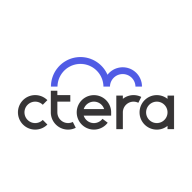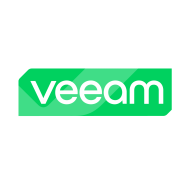

CTERA Enterprise File Services Platform and Veeam Data Platform are both competitive solutions in the enterprise data management and backup industry. CTERA seems to have the edge in scalability and data management flexibility, making it suitable for remote work environments and diverse storage solutions. In contrast, Veeam is favored for its strong backup reliability and comprehensive recovery options, appealing to users who prioritize disaster recovery.
Features: CTERA excels with its scalable and flexible data management platform, seamless backup and recovery capabilities essential for remote workflows, and compatibility with diverse storage solutions. Veeam focuses on reliable, consistent backups, the ease of setup and recovery processes, and the integration and instant recovery capabilities that allow for rapid disaster recovery.
Room for Improvement: CTERA could enhance its offering by improving system monitoring, streamlining its update process, and developing robust global data management features. Veeam needs to address physical server backup issues, optimize backup processes for fewer disruptions, and simplify licensing while enhancing cloud integration and documentation.
Ease of Deployment and Customer Service: CTERA's hybrid model ensures ease of integration in various environments, complemented by responsive support, fostering robust customer relationships. Veeam is also praised for its manageable deployment and supportive customer service, providing solutions across various environments with a swift, efficient support team.
Pricing and ROI: CTERA is known for its competitive pricing, reducing Total Cost of Ownership through minimized hardware demands and efficient data management. Veeam offers flexible but sometimes costly pricing that users find justifiable due to the service's reliability. Both platforms demonstrate substantial ROI stemming from reduced management costs and enhanced efficiency over time, with CTERA noted for advantageous TCO and Veeam for comprehensive service offerings.
Adding SSD storage to Windows file servers is expensive, and we no longer need to back up those devices.
I am positive that CTERA has helped reduce the total cost of ownership by eliminating the need for manual storage management and reducing storage service processes.
They swiftly address concerns and take ownership of the call, providing a very satisfactory support experience.
High-priority issues are handled promptly.
I would rate their support a ten out of ten.
Most cases are handled perfectly.
I would rate their technical support a 10 out of 10.
The escalation from first, second to third tier is sometimes very long-lasting, but the resolve rate is quite high.
If we need to upgrade CPU and memory, we should be able to do that without a license upgrade.
CTERA is a very scalable product, allowing us to grow.
It offers good scalability options, including vertical and outward scalability.
It involves acquiring additional licenses as needed.
In order to scale Veeam Data Platform, we have to pay a lot more money.
It has been pretty stable since then.
We had things deployed for years, and we were suddenly getting cloud sync issues that were crashing our sites.
It is very stable and reliable.
There are no issues with stability in Veeam Data Platform.
AI and automation features could enhance the platform, such as AI-powered search, predictive storage analytics, and intelligent alerts for proactive monitoring.
The main problem is that if two people are working on the same file, for example, one in the U.S. and one in Israel, they can overwrite each other’s work without any notification.
It would help to have a global single-pane-of-glass view of all my CTERA devices.
The improvement we would like to see is the option to scale Veeam Data up in smaller sections rather than large sections, which requires paying much more.
Reducing it by 20% would make it more accessible to a broader range of customers.
OpenStack is something Veeam Data Platform doesn't support, and they haven't indicated that they will support it in the future.
Unlike other solutions that require hardware purchases, CTERA offers software licensing with flexibility across multiple infrastructure providers.
CTERA’s pricing should be more proportional and accessible so that cost is not the factor preventing customers from purchasing.
CTERA's pricing seems to be on par with some of the other players, such as Nasuni and Azure.
I don't consider the price expensive given its importance.
A reduction of 20% in the current cost would make the solution more attractive to clients.
Veeam Data Platform is more expensive than OpenStack because we pay for it in US dollars, while we pay for OpenStack in Egyptian pounds.
As soon as something is written to the device, CTERA copies it to the cloud, where it's versioned with snapshots so we can recover it.
A vital advantage of this platform is its instantaneous recovery capability, allowing seamless access to a secondary gateway if the primary one fails.
It is a three-in-one solution for us. It is a file-sharing platform, an archiving solution, and also a backup solution.
The platform is user-friendly, comprehensive, and compatible with numerous market solutions, including virtualization and bare metal servers.
The most important aspect of this platform is data security with immutable data in the storage.
Veeam Data Platform is valuable for its stability and the ability to easily contact support for assistance.
| Product | Market Share (%) |
|---|---|
| Veeam Data Platform | 12.4% |
| CTERA Enterprise File Services Platform | 0.6% |
| Other | 87.0% |


| Company Size | Count |
|---|---|
| Small Business | 2 |
| Midsize Enterprise | 2 |
| Large Enterprise | 6 |
| Company Size | Count |
|---|---|
| Small Business | 216 |
| Midsize Enterprise | 99 |
| Large Enterprise | 138 |
The CTERA Enterprise File Services Platform provides a cloud-native global file system over public and private object storage, revolutionizing the world of hybrid cloud data solutions. Enhanced by a rich data services ecosystem, CTERA enables enterprises to gain full control of their data for optimal edge performance, data insight, and governance. The platform focuses on security, providing features like data encryption, access controls, and ransomware protection. Centralized management tools enable efficient data control and monitoring. The platform is being used to replace legacy NAS and file servers, especially at remote locations, and simplify backup and disaster recovery of file data while providing the flexibility of multi-cloud deployments with infinite scalability. CTERA is at the core of hybrid cloud transformations of some of the world’s largest banks, healthcare organizations, global media groups, and government agencies, in deployments that scale to tens of petabytes.
Veeam Data Platform is designed for modern data management, providing secure backups, intelligent data insights, and resilience. It ensures data is protected, recoverable, and manageable across complex environments, supporting business continuity effectively.
Veeam Data Platform stands out with its robust capabilities in data protection, orchestrated recovery, and efficient management. It offers a simple interface while ensuring data security and availability, which is critical for businesses. The platform's compatibility with virtual machines, databases, and applications across VMware, Hyper-V, and cloud environments makes it a versatile choice for backup and disaster recovery strategies. Users gain confidence from its performance, from secure backups to facilitating effective infrastructure monitoring.
What are the key features of Veeam Data Platform?Veeam Data Platform is widely implemented by industries needing robust disaster recovery plans and data management solutions. It is particularly valuable in environments utilizing hybrid cloud solutions, protecting mission-critical workloads, and ensuring business continuity. Businesses leverage its capabilities to safeguard data integrity and facilitate long-term retention through efficient infrastructure management.
We monitor all Cloud Backup reviews to prevent fraudulent reviews and keep review quality high. We do not post reviews by company employees or direct competitors. We validate each review for authenticity via cross-reference with LinkedIn, and personal follow-up with the reviewer when necessary.